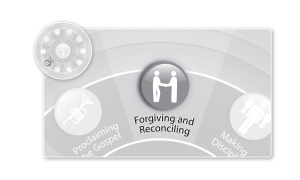 As I travel around the world speaking about the North Korean underground church, one of the things I observe is that Christians in the West invariably love to hear stories about how persecuted Christians produce jaw-dropping, heart-warming forgiveness with the same frequency and ease with which McDonald’s produces french fries.
As I travel around the world speaking about the North Korean underground church, one of the things I observe is that Christians in the West invariably love to hear stories about how persecuted Christians produce jaw-dropping, heart-warming forgiveness with the same frequency and ease with which McDonald’s produces french fries.
The one small problem with this is that it’s not true.
In my own experience, persecuted Christians struggle with unforgiveness at least as much as Christians in the West do. They may even struggle with unforgiveness more than we do, given the suffering their families, villages, and churches regularly experience. Persecuted Christians are sometimes some of the least forgiving and most bitter saints I meet.
I can recall a Voice of the Martyrs/US Conference years ago to which Mrs. Foley and I had brought a North Korean brother to speak. An American man and his five year old son came up to meet the North Korean after his presentation, and the American greeted our brother by saying, “This is my son, Little Timmy. He prays every night that God will open Kim Jong Il’s heart to accept the gospel.” Our North Korean brother turned to us and said, “Really? I just pray every night that God kills him.”
When we assume that forgiveness somehow flows spontaneously in a persecuted setting, we overlook the reality that forgiveness is described in Scripture as a spiritual discipline, not a miracle. It is learned, in other words, not latent. We learn how to extend forgiveness to those who commit big sins against us by first extending forgiveness to those who commit little sins against us. And when we fail to see the connection between extending little forgivenesses and extending big forgivenesses, we hyperspiritualize persecuted Christians, letting ourselves off the hook from growing in the grace of forgiveness and ignoring the reality that it doesn’t matter where you are a Christian; God is going to seek to grow you daily in the Work of Mercy of forgiving and reconciling.
At Seoul USA’s Underground University we train North Korean defectors to serve as missionaries wherever North Koreans are found. One of the ten curriculum tracks we teach is forgiveness. It may be the hardest track of all for the students, even more arduous and demanding than survival training and the constant Scripture memorization.
After teaching UU for four years, I can assure you that genuine, authentic, lasting forgiveness of the North Korean regime does not arise spontaneously in the hearts of North Korean Christians. It must be practiced–not because it’s a human effort but because it’s an act of surrender to the work of the Holy Spirit. Truth is, we don’t like where the consequences of forgiveness lead us, i.e., to the hard (and yes, Holy Spirit-powered) life of reconciled relationships.
In order to ensure that we grow in our practice of forgiveness each day, Jesus inserts into the Lord’s Prayer a daily petition that God’s forgiveness toward us be shaped by our forgiveness toward others. “Forgive me today in the same way I am forgiving others today, Lord.” That is humbling and stretching no matter in what nation God calls you to be his disciple. It is not an ounce easier in Nigeria than in North Dakota.
Yes, beautiful, breathtaking forgiveness does happen among persecuted Christians. But it happens among those who have daily kept their hearts tender before the Lord through far less breathtaking, far more mundane acts of forgiveness preceding the hurt. The most moving stories of forgiveness in places like North Korea and Pakistan and Eritrea are not ones where a persecuted Christian spontaneously extends forgiveness to those who harmed his family. The most moving stories are the ones where a persecuted Christian prepared for the major forgiveness he would need to offer by working daily through the mundane morass of underground church conflicts, fights with his wife, and spats at work with co-workers.
The miracle, in other words, is not the spontaneous extension of forgiveness but the hard-won battle quietly waged daily by the Holy Spirit to keep each of us from slipping into the sludge of bitterness, not at the hands of our worst enemies but rather our regular and closest companions.











-too often we overlook this fact as westerners. Hello! it should be plain as day since unforgiveness is a sin for all humans to deal with. Thank you Brother Foley for bearing this fact out.